|
|
|
Sort Order |
|
|
|
Items / Page
|
|
|
|
|
|
|
| Srl | Item |
| 1 |
ID:
140320


|
|
|
|
|
| Summary/Abstract |
For more than two decades, the Financial Action Task Force (FATF) has been the central governance network for developing anti-money laundering policies. It serves as a prototype of a new form of governance, linked to soft law, peer reviews, and expert advice. Literature on the FATF, however, rarely questions the transferability of this model to other areas of global governance. Seeking to fill this gap, this article analyzes the networking activities that created and maintain the FATF. I argue that two major difficulties are particularly challenging for any global governance network: initiation problems and commitment problems. The article describes how the FATF’s members have overcome these difficulties and developed the network over time. It also shows that some tools and conditions that contributed to the FATF’s success are difficult to replicate for other networks. The conclusions outline some ways to overcome these challenges and present further questions for research.
|
|
|
|
|
|
|
|
|
|
|
|
|
|
|
|
| 2 |
ID:
183635


|
|
|
|
|
| Summary/Abstract |
The development of renewable energy policies in Taiwan has been thoroughly discussed from political, economic, social, industrial and environmental perspectives. Energy policies, particularly those adopted by the United Nations (UN) and other international organizations, have influenced both (1) the decision-making process of energy policies such as action plans, programs and (2) the transition to renewable energies. This paper argues that the transfer of global environmental and energy policies serves as the mechanism behind Taiwan’s efforts to expand renewable energy production. These global policies have so far been practiced by international organizations through agreements designed to combat climate change, achieve sustainable development goals (SDGs), and reduce fossil fuel subsidies. This paper examines renewable energy policies and legislation in Taiwan through the lens of policy transfers, an area which has not been fully explored in previous research.
|
|
|
|
|
|
|
|
|
|
|
|
|
|
|
|
| 3 |
ID:
075662


|
|
|
| 4 |
ID:
167583


|
|
|
|
|
| Summary/Abstract |
In view of Turkey’s increasing distance from the European Union (EU), the continued partial alignment with EU standards is often attributed either to domestic factors, or to diffusion processes induced by external actors other than the EU. Against this background, in this special issue, we explore the extent to which reforms in Turkey’s environment and energy policy are (still) influenced by the EU. This introduction briefly reviews the Turkey related Europeanisation literature and previews the articles in this special issue.
|
|
|
|
|
|
|
|
|
|
|
|
|
|
|
|
| 5 |
ID:
119192
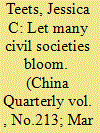

|
|
|
|
|
| Publication |
2013.
|
| Summary/Abstract |
In this article, I analyse civil society development in China using examples from Beijing to demonstrate the causal role of local officials' ideas about these groups during the last 20 years. I argue that the decentralization of public welfare and the linkage of promotion to the delivery of these goods supported the idea of local government-civil society collaboration. This idea was undermined by international examples of civil society opposing authoritarianism and the strength of the state-led development model after the 2008 economic crisis. I find growing convergence on a new model of state-society relationship that I call "consultative authoritarianism," which encourages the simultaneous expansion of a fairly autonomous civil society and the development of more indirect tools of state control. This model challenges the conventional wisdom that an operationally autonomous civil society cannot exist inside authoritarian regimes and that the presence of civil society is an indicator of democratization.
|
|
|
|
|
|
|
|
|
|
|
|
|
|
|
|
| 6 |
ID:
178718


|
|
|
|
|
| Summary/Abstract |
Most accounts of East Asian economic growth have focused on the role of developmental states in successful industrialization. This article expands and challenges that framework by showing that rural policy was different from industrial policy. A key finding is that for more than a century, East Asian states have relied on mass mobilization campaigns rather than on technocratic planning and market-conforming institutions to achieve rural development. Based on case studies of Japan, South Korea, Taiwan, and China, the author argues that three main factors explain the rise of campaign states: revolutionary traditions, rural populism, and policy learning. A brief assessment of outcomes illustrates the payoffs and costs of campaigns and the practical considerations that drive them. The author’s analysis offers a new perspective on the East Asian model and disputes the widely held view that campaigns are tragic exercises in social control, demonstrating instead that they were central to the region’s rural transformation.
|
|
|
|
|
|
|
|
|
|
|
|
|
|
|
|
| 7 |
ID:
154370
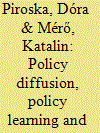

|
|
|
|
|
| Summary/Abstract |
This article explains why certain Central and Eastern European states adopted macroprudential policies of local design that went beyond what European Union and International Monetary Fund authorities had recommended after the global financial crisis. We argue that macroprudential policies increase state control not only because of their inherent normative view on the inefficiency of markets, but also because governments use macroprudential policy to enhance state power. We show that macroprudential tools have often been used to satisfy local policymakers’ own agendas: financial nationalism in Hungary and protectionism in Slovakia.
|
|
|
|
|
|
|
|
|
|
|
|
|
|
|
|
| 8 |
ID:
167584


|
|
|
|
|
| Summary/Abstract |
This article argues that EU-induced learning processes in Turkish domestic politics deserve greater attention within the Turkey-related Europeanization literature, which, in view of Turkey’s increasing distance from the European Union, tends to attribute a continued partial alignment with EU policies to either domestic, or to non-EU-related external factors. Two arguments are put forward. First, in domestically driven reform processes, the EU may still be able to influence policy choices due to domestic actors’ bounded rationality and conflicting goals. Second, while persuasion and learning at the top political level is rather unlikely, given the currently tense relations, there are much more favorable context conditions for EU-induced learning in the interaction of the Turkish bureaucracy with the EU.
|
|
|
|
|
|
|
|
|
|
|
|
|
|
|
|
| 9 |
ID:
180170


|
|
|
|
|
| Summary/Abstract |
Effectiveness of renewable energy feed-in tariff (FiT) varies across the world. Designing policy mixes of a package of policy instruments to optimise the normative effect of FiT is critical but has remained challenging and under-studied. This paper brings together the key concepts of policy mixes and policy learning to examine how the effectiveness of renewable energy policies can be improved, with reference to a recent FiT policy in Hong Kong focusing two prospective solar communities. Based on 99 in-depth interviews and workshop discussions involving 57 householders, we found that FiT was an effective policy in stimulating growth of new solar photovoltaic (PV) projects in some sub-sectors in Hong Kong, but has not yet mainstreamed solar at the community and city levels. The FiT was insufficient to address multiple non-economic barriers perceived by householders. The limited policy impacts of the FiT indicated that policy makers were able to attain technical learning, but faced major constraints in advancing to conceptual and social forms of policy learning. This paper concludes that policy makers should give closer attention to policy mixes and advanced forms of policy learning than choosing a single “most effective” policy instrument to unlock the under-used community solar potentials.
|
|
|
|
|
|
|
|
|
|
|
|
|
|
|
|
| 10 |
ID:
176106


|
|
|
|
|
| Summary/Abstract |
What are the forces that drive increasing adoption of voluntary agreements in the policy field? This paper attempts to answer the question by analyzing the mechanism behind the adoption by 877 entities of the voluntary energy efficiency and GHG reduction agreement (VA) that was in place between 1999 and 2010 in South Korea. We argue that in South Korea's distinct regulatory context, participation in a public voluntary program (PVP), a VA, is a manifestation of participant entities' varied motivations as well as regulatory and social-normative pressures that arise from the institutionalization of the VA program. In addition, aligning the PVP with other policy programs such as eco-labelling program was found to have provided additional incentives for adoption while public ownership, socioeconomic status and environmental management capacity of targeted entities were significant factors. Thus, this study analyzes changes in the motives of participant entities over the course of the program's maturation and demonstrates how government and industries adopt and manage a PVP for policy learning and strategic regulation in the area of energy efficiency management and GHG reduction.
|
|
|
|
|
|
|
|
|
|
|
|
|
|
|
|
| 11 |
ID:
173251
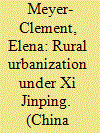

|
|
|
|
|
| Summary/Abstract |
‘Rural community building’ is one of the most prominent policies of rural urbanization and village renovation in China. Since the nationwide implementation of this policy within the scope of the programme ‘Building a new socialist countryside’, the large-scale construction of new residential complexes has accelerated the transformation of the country’s rural landscape. However, extensive demolition and relocation have drawn increasing criticism, and the policy has become synonymous with the seizure of rural land resources by local governments. When Xi Jinping came to power, the new leadership initially appeared to abandon the policy but has eventually revived it. This article studies the implementation and evolution of the rural community building policy as a case of policy learning. The analysis of national and local policy documents and implementation practices in four provinces highlights a new framing of the policy, more intensive hierarchical controls over rural land use, and the state’s increasing reach into village governance, as well as new incentives for local governments to continue with demolition and relocation projects. These changes reveal a mode of policy learning in the context of an authoritarian regime whose goal is to improve policy implementation in the face of growing public criticism and social tension.
|
|
|
|
|
|
|
|
|
|
|
|
|
|
|
|
| 12 |
ID:
167587


|
|
|
|
|
| Summary/Abstract |
Combatting climate change and ensuring energy security require diversification of energy profiles through alternative resources, with nuclear energy being the most controversial one. Although the preferences among its members differ, the EU offers a specific legal and practical framework for nuclear energy. Turkey, on the other hand, emerges as a ‘newcomer’ in the nuclear energy field, revealing a need for policy learning for safe and secure nuclear energy generation. This research focuses on the Europeanization of Turkey’s nuclear policy to trace whether a strategic or social learning takes place within the nuclear energy framework. The analysis also questions to what extent the EU and Turkey’s framing of nuclear energy coincides or diverges with reference to the climate change.
|
|
|
|
|
|
|
|
|
|
|
|
|
|
|
|
| 13 |
ID:
167588


|
|
|
|
|
| Summary/Abstract |
Regarding urbanization policy in Turkey, one can observe how policy-making efforts continuously have moved away from transnational influences and reverted to more pragmatic, national-oriented practices in the last three decades. The results of different attempts to make sustainable urbanization policy for Turkey are vivid examples of how aspirations to reframe national urban development pattern through policy transfer failed and a nationalistic, pragmatic and authoritarian intervention, each time more hard-hitting than before, emerged with dire consequences. Occasionally, distinctive characteristics of the Turkish experience manifested itself in the uneasy symbiosis of policy-making with neo-liberal practices in cities. Using qualitative methodology, this study provides an account of Turkey’s urbanization policy-making episodes in the last decade to show how consecutive attempts to use policy learning and participation as leverage gradually alienated policy intermediaries and allowed strengthening of neo-liberal interventions in urban sphere.
|
|
|
|
|
|
|
|
|
|
|
|
|
|
|
|
| 14 |
ID:
167590


|
|
|
|
|
| Summary/Abstract |
Numerous scales in climate change politics might create problems for activists, as it is not always easy to locate the appropriate level(s) according to which they develop collective action frames. Therefore, activists might address various scales while identifying the problem and building strategies accordingly. The Turkish climate movement has been active through protest cycles largely influenced by global climate negotiations. Following the failure of the Copenhagen Climate Summit (2009) in delivering a binding climate deal, the movement shifted its strategy. Using the protest event analysis method and the movement’s archives, this paper attempts to shed light on how the Turkish climate movement learned from this global policy failure and why it switched from the global diagnostic and prognostic framing to a national/local one. Following this, the extent the European and transnational actors contribute to this frame shift will be discussed.
|
|
|
|
|
|
|
|
|
|
|
|
|
|
|
|
| 15 |
ID:
121751
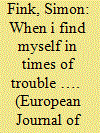

|
|
|
|
|
| Publication |
2013.
|
| Summary/Abstract |
Most quantitative analyses of policy convergence treat transnational communication in international organisations and domestic economic problems as additive factors. By contrast, this article argues that domestic economic problems motivate governments to search for successful policies, while international organisations offer channels for policy learning. Thus, both factors interact, magnifying each other's effects. The argument is corroborated by a quantitative analysis of the privatisation of telecommunications providers in the Western OECD world. A dyadic logit model shows that joint membership in international organisations increases the likelihood of policy convergence if governments face budget deficits. The argument of the article builds a bridge between theories of international organisations and domestic theories of policy making. Theories of the former gain an important scope condition specifying the conditions under which transnational communication works, while exploring the latter gains a theory specifying where new policy ideas come from.
|
|
|
|
|
|
|
|
|
|
|
|
|
|
|
|
| 16 |
ID:
111905
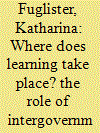

|
|
|
|
|
| Publication |
2012.
|
| Summary/Abstract |
Although it is widely accepted that a decentralised system can enhance policy learning and the spread of best practices, an under-researched question is where that learning process takes place. Using data on the diffusion of health care policies in Switzerland, this article analyses the role of institutionalised intergovernmental cooperation and its impact on the spread of successful policies. The results show that joint membership of policy makers in health policy specific intergovernmental bodies is related to the diffusion of best practices.
|
|
|
|
|
|
|
|
|
|
|
|
|
|
|
|
| 17 |
ID:
075663


|
|
|
|
|
| Publication |
2006.
|
| Summary/Abstract |
Which countries learn from which other countries in the course of cooperation in the Nordic and European open method of coordination (OMC) committees? That is the key question this article addresses.The goal is to contribute to the body of research on Europeanization by exploring its 'horizontal' thrust. The object of the study is the direction of learning as perceived by participants in European OMC committees and Nordic committees with similar functions. The approach implies cross-testing of two key hypotheses: (1) the direction of learning in international committees is dependent on which countries can show 'best practice', and (2) learning in international committees is dependent on the degree to which countries share a similar economic-political background (the 'most similar' hypothesis). The cross test affirms the 'best practice' hypothesis, whereas the 'most similar' hypothesis is shown to be significant only to the extent that
|
|
|
|
|
|
|
|
|
|
|
|
|
|
|
|
|
|
|
|
|